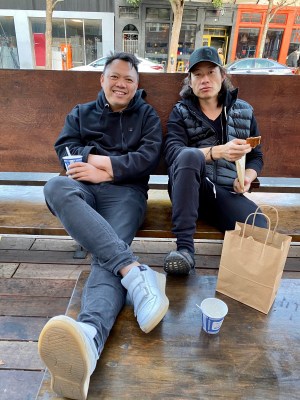Justin Kan and Robin Chan have each been angel investing for more than a decade. They’re starting a new fund together now, though, to stay involved as cofounders of more startups.
Goat Capital is a hybrid incubator versus a pure seed investment firm, Chan explains. It will be writing checks ranging between roughly half a million and $3 million dollars, and it is only planning to raise $40 million — so the checks will be selective.
The offering is that “you’re going to be working with Justin and Robin,” he says, as a direct collaboration to help your company succeed. With $25 million closed already from themselves and several family offices, the fund has begun investing globally with particular interests in digital health, ecommerce, digital entertainment and gaming, robotics and climate change.
The goal is not just about being the Greatest Of All Time, Kan adds. In a startup, you “climb high heights and eat shit to get there. That tenacity is what we want.”
It’s a nod to their own successes and struggles as founders over the years, and what they have seen as investors and advisors to a wide range of companies around the world (Twitter, Xiaomi, Bird, Uber, Square, Ginkgo Bioworks, Scale.ai, Cruise, Razorpay, Xendit, Equipment Share, Wave, Teachable, Semantic Machines, Rippling, Built Robotics, etc.)
Kan was a cofounder of Justin.tv, which became Twitch as well as Socialcam. He later had an on-demand company called Exec and previously a calendar app called Kiko, both of which sold for small amounts. Most recently, he took a big shot at the traditional legal industry with Atrium, a law firm and legal software startup that raised big rounds of funding before shuttering earlier this year.
His prototype for Goat is Alto Pharmacy, a booming digital health unicorn today that the founders started in his living room.
“We do think founders should be treated like athletes, going for gold really hard… the Olympic metaphor,” Kan qualifies about the name. “That means grinding for years — and having to rest, too. I’m very passionate about mental health and wellness as part of the journey.” (More on that here.)
Chan, meanwhile, sold his gaming startup in China to Zynga a decade ago, then helped lead a failed attempt to buy Blackberry before founding Operator, a well-funded ecommerce company that closed a few years ago. During the pandemic, he helped create Operation Masks, a nonprofit that has been providing PPE across the US. He’s also an ongoing advisor to Sleeper, Bird, Expa and Flipboard.
The focus will be fully global now. Chan explains that even though you’re seeing more challenges to building a truly global company these days, there’s more space for local startups to win big.
“There’s the US internet, the China internet, the India internet, the EU internet — in some ways it makes those markets more valuable to win, like traditional media. Broadcast and cable are highly geographic but the franchise value becomes higher because of the regulatory moat.”
Chan, on that note, met Kan back when he was a director at [current TechCrunch owner] Verizon Wireless, when Justin.tv was trying to negotiate for free data. When I asked if they had worked out a deal during a phone interview, Kan said “you [expletive] didn’t.”
But it did lead to other co-investments later on, including Ramp, Workstream and others, and now this fund.
Today, Kan says that the focus on teams will be as flexible as the times. “When we started, the internet was America,” he says. “If you weren’t there, you weren’t a company. It’s been a complete reversal of that. Now teams are international, talent is international, more and more companies are building remote first — although you’d seen that before given the costs of the Bay. We have an entirely remote company in North Carolina, Grammarly in Europe… it’s more and more the norm. Smart founders are going anywhere to find talent.
For the two partners, this new fund will be about staying connected to that certain startup feeling that is elusive for anyone trying to build something great.
“There’s nothing more magical than being in the first step of a special company,” Chan says. “That glimpse of the future. We wouldn’t get the same feeling at the growth stage versus working with small teams or a single founder. I think we have the instinct.”
